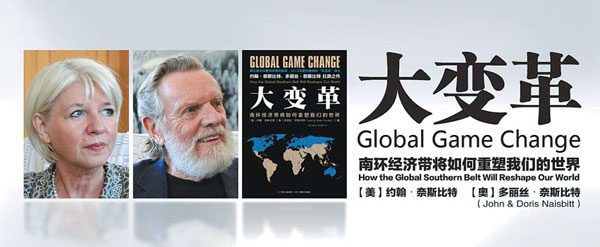China 'the game-changer'
Updated: 2015-01-30 08:43
By Zhang Yue(China Daily Europe)
|
|||||||||||
Futurists see swathe of countries creating world's largest middle class
John Naisbitt, the author and public speaker on futurism, and his wife Doris predict that Asia will surpass both North America and Europe in economic power, military spending and technological investments by 2030.
In Beijing to promote their new book, The Global Game Change: How the Global Southern Belt will Reshape Our World, they raise the idea of a "global southern belt" that includes more than 150 of the 196 countries in the world, the majority of which are located in Asia, Latin America and Africa.
|
John Naisbitt and his wife Doris say Asia will surpass North America and Europe in economic power, military spending and technological investment by 2030. Photos provided to China Daily |
|
The Global Game Change: How the Global Southern Belt will Reshape Our World, by John & Doris Naisbitt. Photos provided to China Daily / China Daily |
"Nations of the global southern belt are in the process of creating the largest middle class the world has ever witnessed," he says.
In 2013, for the first time, the combined GDP of the world's 150 emerging economies, excluding China, was larger than the combined GDP of 37 developed countries excluding the United States.
In the book, which was published in Chinese in December, before the English-language version, the two write: "We should notice that China is very good at adjusting itself amid global trends. China's a doer rather than a talker in many global challenges we are facing at the moment. Its successful reform and opening-up is a good example."
The book points out that countries with emerging economies are turning into global players, with one chapter devoted to China and calling the nation "the game changer".
The Naisbitts' confidence in China stems not only from statistics and research. Over the years the couple traveled to more than 20 cities and provinces around China, including to the remote countryside.
Five years after John Naisbitt's China's Megatrends, which said that the nation was creating a new economic model that would challenge Western democracy and global trade, The Global Game Change shows the couple is even more confident about China.
The couple - Doris is 64 and sometimes has to finish what her 85-year-old husband has to say - divide their time between Vienna, Austria, and Tianjin, where they established the Naisbitt China Institute in 2007.
In Beijing for a small-scale book fair the first week of January, John says he first came to China in 1967, right after the "cultural revolution" (1966-76) began and traveled to Shenzhen on his way to Taiwan.
"Shenzhen was such a small fishing village at the time," he recalls. "Look at how much it has transformed now."
Since that time, his visits to China grew more and more frequent. Both of them are visiting professors at several universities around China, including Beijing Foreign Studies University, Nankai University in Tianjin and Jilin University. Doris is also a contributing writer to China Youth Daily, a newspaper whose readership range from teenagers to people in their early 30s. The writing opportunity has opened a path for the couple to communicate with China's younger generations. Over the years, they've also given talks to middle school and university students.
"What we cherish about the country is that people are opening up," Doris says.
In the summer of 2005 the couple gave a talk to hundreds of students at a large auditorium at a county-level middle school. At the end of her lecture, she asked: "Are there any questions?"
It was the first time for most of these rural students to be in a room with foreign professors, and there was a predictable moment of silence. Doris says she noticed a boy sitting in the second row cautiously raising his right hand. She walked over to him, hoping to encourage him to speak up.
The boy took the microphone, stayed silent for a while and said: "I loved a girl. But she did not love me."
It is a moment the Naisbitts say they will always remember among the many faces they have seen and met in China. The whole auditorium came to a halt before erupting with applause.
"People here are opening up. Young people, teenagers are opening up. They are willing to talk about their own feelings," Doris says. "Much of what we read about the Chinese, their restrictions, confining to themselves, are changing. The country is showing its great potential from its people."
John says the Western media criticize China "self-righteously and condescendingly".
"But stories about China are emerging, taking more and more space in newspapers, at least about its economy. China has become a rising power that no one can ignore."
To conduct research for their book, the Naisbitts traveled to China's second- and third-tier cities through the invitation of local governments, which had hoped that the perfect combination of the two academics, one from the US and one from Europe, would produce positive observations for the book.
"And we were truly amazed when we visited counties in Sichuan and Guizhou, where the students welcomed and talked to us in English."
In China's Megatrends, John Naisbitt illustrates the "eight pillars" that support China's reform: "emancipation of the mind", "balancing top-down and bottom-up", "framing the forest and letting the trees grow", "crossing the river by feeling the stones", "artistic and intellectual ferment", "joining the world", "freedom and fairness" and "from Olympic gold medals to Nobel prizes". The book was criticized by many young Chinese readers on the Internet who said Naisbitt did not fully understand China.
In their latest book, the Naisbitts write: "China has become the major game player in the global community and, as part of its new position, a game changer in global investment streams. The most important relationship, China-US relations, will show in both: shaping the global context and being shaped by the global context."
zhangyue@chinadaily.com.cn
( China Daily European Weekly 01/30/2015 page28)
Today's Top News
President Xi meets Russian Foreign Minister
US taking 'fresh look' at weapons for Ukraine
New regional system set up
EU Parliament evacuated as police check suspicious car
Indian PM expected to visit President Xi's hometown
Dalai Lama-Obama meet risks Sino-US trust
Nearly 90% of cities in China don't meet air quality standard
Chinese money flows into UK
Hot Topics
Lunar probe , China growth forecasts, Emission rules get tougher, China seen through 'colored lens', International board,
Editor's Picks

|

|

|

|

|

|







